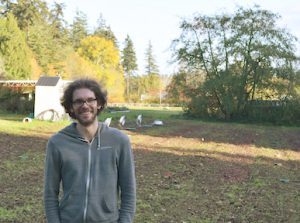Organic farmers have trade-offs to consider when it comes to their options for managing soil fertility, according to new research from a University of Florida scientist.

Gabriel Maltais-Landry, an assistant professor in the UF/IFAS Soil and Water Sciences Department, said the effort to make an organic farm system more sustainable hits an obstacle when considering nutrient inputs to fertilize crops. Producers have a choice of using fertilizers coming directly from the farm, from another site, or a combination of the two.
“When you hear ‘organic farming,’ you probably think of fertilizer sources right there on the farm, such as legume cover crops like clover or sunn hemp, compost from crop residues, and manure from onsite animals,” Maltais-Landry said. “While that’s true in some cases, other operations need to use off-farm sources like municipal compost or commercial fertilizers to provide the nutrients that will increase yields.”
Working as a postdoctoral researcher with colleagues at the University of British Columbia in Vancouver, Maltais-Landry compared four certified organic systems. A mix of vegetable crops grew with either composted poultry manure, municipal waste compost, and/or processed fertilizers as a soil amendment. Those were added to meet the recommended amounts of nitrogen or phosphorus for the crop, which leads to trade-offs between under-fertilizing for the former or over-fertilizing for the latter, Maltais-Landry said.
The resulting yields and environmental impacts were mixed. For instance, municipal compost minimized the trade-offs for crops with a low nitrogen demand, but the manure-based system helped increase yields for crops with a high nitrogen demand. Manure also had the highest environmental impacts in terms of phosphorus over-fertilization, nitrate leaching risks, and greenhouse gas emissions. The use of processed fertilizers had results between the other two options, despite having the largest costs for farmers.
“We found there really is no silver bullet when it comes to being an ideal organic operation,” said Maltais-Landry. “More work is needed to develop high-yielding and sustainable organic vegetable systems, and we think this will occur through a combination of inputs that will minimize environmental impacts.”
The research was published in the journal Agriculture, Ecosystems and Environment. You can read it here.
 0
0
